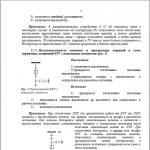Business travel guarantees and compensation for business trips. Guarantees and compensation when sending employees on business trips and to work in another area. Compensation for business trips due to an employee
 When planning a business trip within the territory of the Russian Federation or abroad, there is always a possibility that the set goal will not be achieved upon the employee’s return. Conflict situations often arise, sometimes leading to litigation, in which the main issue is the need to take specific costs into account, as well as the amount of payments due to the employee for an unsuccessful trip. To avoid such situations, the employer initially provides guarantees when sending employees on business trips and a procedure for reimbursement of compensation payments.
When planning a business trip within the territory of the Russian Federation or abroad, there is always a possibility that the set goal will not be achieved upon the employee’s return. Conflict situations often arise, sometimes leading to litigation, in which the main issue is the need to take specific costs into account, as well as the amount of payments due to the employee for an unsuccessful trip. To avoid such situations, the employer initially provides guarantees when sending employees on business trips and a procedure for reimbursement of compensation payments.
Definition of a business trip, its regulatory framework
Based on Art. 166 of the Labor Code of the Russian Federation, a business trip is considered to be a trip by an employee, at the initiative of the employer, to another locality for a pre-agreed period in order to carry out specific tasks and goals in the interests of the organization. Thus, a subordinate leaves his actual workplace, which is fixed by an employment agreement, and is sent to another territory. At the same time, he can count on certain guarantees when sent on a business trip.
All business trips are regulated by law. Since 2014, the regulatory framework governing business travel has undergone some modifications. The final adjustments were finalized in 2017. In particular, the main innovation was the change of department. Previously, all issues related to registration, direction and payment of business trips were regulated by extra-budgetary funds. Since 2017, this task has fallen on the shoulders of the tax services. As a result, fixed amounts of daily allowance were fixed, funds above which are subject to taxation.
Thus, since 2018, the main document regulating the issue of business trips is the Tax Code of the Russian Federation. In particular, Art. 217 of the Tax Code of the Russian Federation, which establishes the amount of payments to a subordinate.
However, in these circumstances, the manager should also take into account the provisions of the Labor Code of the Russian Federation, according to which the employee’s expenses on a business trip must be fully reimbursed. No business trip should worsen the financial situation of a subordinate.
Categories of employees not allowed on business trips
The Labor Code of the Russian Federation stipulates that there are certain categories of subordinates who are prohibited from being sent on business trips. This may be due to the employee's marital status or age. In particular, in Art. 259 and Art. 268 of the Labor Code of the Russian Federation states that business trips are prohibited for:
- Women expecting a child;
- Workers who have not yet reached the age of majority.
In addition, in Art. 259 and Art. 264 of the Labor Code of the Russian Federation determines that the following groups of subordinates can be sent on a business trip with written consent and in the absence of medical contraindications:
- Women whose children are under 3 years old;
- Single parents who are raising children under five years of age;
- Employees raising children with disabilities;
- Employees who care for a seriously ill relative based on an official doctor’s opinion.
If an employee from the listed category refuses to fulfill the employer’s request for a business trip, the employer does not have the right to force the subject. If such a requirement is of a compulsory nature, the manager may be brought to administrative liability on the basis of Art. 5/27 Code of Administrative Offences.
Business trip guarantees provided to the employee
If an employer needs to send a specific employee on a business trip who constantly works at the enterprise and does not belong to prohibited categories, he has the right to do without the consent of the subordinate.
Thus, an employee can count on a number of guarantees when sent on a business trip.
During the entire time that the employee is under the authority of the receiving organization, its provisions are valid for this entity. That is, the work and rest procedures used in the receiving company are relevant for the visiting business traveler.
In circumstances where the subject receives or is exposed to any disease, the period of his sick leave will be paid in the standard manner. It is also important to understand that this is only possible with documented evidence of the disease.
Procedure for registration of a business trip
The procedure for registering a business trip goes through the following stages:
- Publication of a manager’s order to send a specific subordinate on a business trip. To draw up this document, you can use the unified form of the T9 form, or use a template approved by local regulations for such cases.
Until 2015, before the order was issued, it was also necessary to draw up a service assignment, on the basis of which the tasks and purpose of the posted employee were determined. In 2018, a similar function is performed by the corresponding column of the order.
Upon familiarization with the order, the subordinate must put his personal signature on the document as proof of his familiarization with it.
The order should also reflect information about the employee’s use of personal transport or transport by proxy, if such an action took place.
- Advance payment to a subordinate. Upon a business trip, the subject has the right to receive advance funds from the enterprise. They must be spent on housing, food and any unforeseen expenses incurred in the interests of the organization. In addition, the subordinate is also entitled to daily allowance - compensation for each day he is on a business trip.
This operation is documented using an expense order. The amount of money issued must be recorded in local regulations. The basis for RKO is a business trip assignment.
In addition, it is important to consider the type of trip. If the business trip is within the Russian Federation, then the advance can be issued in national currency either in person or by transferring money to a card. If an employee is sent abroad, expenses in the territory of the Russian Federation are provided in rubles, and those funds that must be used abroad are issued in the currency of the host country.
- Issuance of a certificate. This provision has not been mandatory for several years; innovations in 2017 finally abolished this requirement. However, most companies continue to use such a document due to its informativeness and convenience. If such paper is drawn up during the sending of the subject on a trip, then this provision must be recorded in the regulatory act of the enterprise.
- Maintaining time sheets throughout the subordinate's business trip. A business trip is marked on the report card with the code “K”.
- Preparation of advance report. Upon the employee’s return, he is given three days to fill out the advance documentation. For the indicated report, the standard form AO1 is used. Attachments should also be added to the expense report. These include all supporting documents that the subordinate collected during the trip. These are: bills for housing, travel tickets or receipts from gas stations, a memo listing additional expenses.
Upon receiving the document in hand, the accounting employee notes this fact on the tear-off part, and then gives it to the employee.
- If an employee has additional funds remaining unspent, he returns them to the company. Also, if an employee spends the amounts issued in excess of the norm, the manager compensates for the overexpenditure.
Compensation for business trips due to an employee
The volume and procedure for issuing compensation to seconded employees is fixed in local regulations.
When a subordinate goes on a business trip, he has the right to count on the following compensation payments:
- Travel expenses. This implies payment not only for train, bus or plane tickets, but also reimbursement of fuel costs if the trip was made by the employee’s own transport;
- Housing costs. This means a bed in a hostel or motel, as well as a hotel room or a rented apartment;
- Food costs. Reimbursement is based on receipts from supermarkets, cafes and restaurants;
- Additional costs, if the manager considers that specific expenses were made in the interests of the company.
The amount of daily allowance is fixed in local regulations.
The labor legislation of the Russian Federation gives employers the right to send employees to another location to carry out production assignments. The business trip is documented and has a number of restrictions. Thus, Article 167 of the Labor Code (LC) reflects guarantees when sending workers on business trips:
- payment of relevant expenses at the expense of the sending party;
- preservation of duty station and others.
Let’s look at what a seconded employee can claim, and who cannot be forced to carry out production tasks away from the enterprise.
Legislation
The rules for formalizing relations related to business trips are described in Chapter 24 of the Labor Code. Article 166 contains the definition of a business trip and restrictions on its application:
“A business trip is a trip by an employee by order of the employer for a certain period of time to carry out an official assignment outside the place of permanent work. Business trips of employees whose permanent work is carried out on the road or has a traveling nature are not recognized as business trips.”
Download for viewing and printing:
Thus, only an employee who has a specific place of application can be seconded by his superiors. If, under the terms of the contract, the employee is traveling, then the relationship is formalized in a different way.
Definition: a business trip is the sending of an employee with a production task to a place different from the work place:
- to another locality;
- in the same city, but away from the enterprise.
The remaining paragraphs of the chapter outline the responsibilities of the employer in relation to the posted employee. The types of these are shown in the table:
Restrictions
 The Labor Code includes among the preferential categories of workers whose business trips are prohibited:
The Labor Code includes among the preferential categories of workers whose business trips are prohibited:
- pregnant women;
- minors;
- students (paragraph 203).
Some employees must be warned about the upcoming task against their signature in order to obtain consent (paragraph 259 of the Labor Code). These include:
- mothers of children under 3 years old;
- parents raising disabled minors;
- persons caring for sick relatives (if there are medical indications);
- single parents with children under five years of age.
Nuances of application of the law
Labor legislation applies to persons employed within the framework of an employment contract. In addition, the secondment of employees must be documented with the following documents:
- by order (form T-9);
- travel certificate (T-10);
- written assignment;
- report on the implementation of the latter (T-10a).
Attention: absence from the place of work without appropriate documentation is not considered a business trip:
- a worker may be accused of absenteeism;
- the accountant who paid the travel allowance was in violation of the law.
Guarantees under the Labor Code are provided only to employees who have received a written assignment. The order is drawn up by the personnel department on the basis of a written assignment from the manager. The employee gets acquainted with the document and signs it.
After completing the assigned task, the business traveler is required to submit a financial report on expenses to the accounting department. The period is three days. Payments guaranteed by law are calculated based on the report.
Guarantees for a posted employee
 The worker retains his place of work. This means the following:
The worker retains his place of work. This means the following:
- The person must begin to perform his job duties after returning.
- Management does not have the right to dismiss or transfer an employee to another position while he is performing a task away from the enterprise.
- The worker retains his average daily earnings.
Do you need information on this issue? and our lawyers will contact you shortly.
Payment of expenses
 Fulfilling the tasks set by management is associated with additional costs. These are carried out at the expense of the enterprise. The law classifies the following as expenses:
Fulfilling the tasks set by management is associated with additional costs. These are carried out at the expense of the enterprise. The law classifies the following as expenses:
- for travel to the place of business trip;
- for renting housing (if the period exceeds one day);
- additional (daily allowance);
- others (determined by the collective agreement).
Rationing of expenses is determined on the basis of a specific document. Thus, public sector employees and civil servants are paid within the framework of Decree of the Government of the Russian Federation No. 729 of 10/02/02. Its text provides payment limits. Namely:
- for the purchase of travel documents - after the fact;
- to pay for accommodation - no more than 550.0 rub. per day (determined by receipts);
- daily allowance - 100.0 rub.
Travel funding in privately owned enterprises is carried out within the framework of a thematic local act. Moreover, the law does not prohibit including other expenses in its text.
Download for viewing and printing:
Foreign business trips
 Workers traveling outside the country on production assignments need currency. The employer provides such a person. In this case, the accountant is obliged to rely on the provisions of Law No. 173-FZ of December 10, 2003. So, the worker is reimbursed for the following expenses:
Workers traveling outside the country on production assignments need currency. The employer provides such a person. In this case, the accountant is obliged to rely on the provisions of Law No. 173-FZ of December 10, 2003. So, the worker is reimbursed for the following expenses:
- to obtain a foreign passport;
- mandatory fees (consular, for example);
- fee for crossing the border by car;
- purchasing compulsory insurance;
- other.
Reimbursement for out-of-state service
 The conditions for performing job duties are reflected in the contract. If these are associated with constant travel, the employee receives the following payments:
The conditions for performing job duties are reflected in the contract. If these are associated with constant travel, the employee receives the following payments:
- for tickets (gasoline);
- for renting residential premises;
- daily allowance;
- for additional investments made in agreement with management.
Moving to another city due to production needs
 Separately, the legislation describes the situation when an employee has to change his place of residence on the instructions of his superiors. This is possible only with the consent of the person. The latter is documented (you need to take a statement of consent to move to another area).
Separately, the legislation describes the situation when an employee has to change his place of residence on the instructions of his superiors. This is possible only with the consent of the person. The latter is documented (you need to take a statement of consent to move to another area).
The employer is obliged to reimburse the employee for the following confirmed expenses:
- for transportation:
- the employee himself;
- family members;
- luggage;
- to settle down in a new city.
Federal civil servants receive payments described in government decree No. 187 of 04/02/03. Employees of private enterprises receive compensation payments fixed in the local acts of the enterprise.
Download for viewing and printing:
Question - answer
 How are business trip days taken into account if the plane's departure is scheduled for 24:00?
How are business trip days taken into account if the plane's departure is scheduled for 24:00?
The procedure for recording business trip time is described in Decree of the Government of the Russian Federation No. 749 of October 13, 2008. Thus, the next day is considered the beginning of absence from the place of duty. However, in this case, not only the plane ticket is taken into account, but also the travel time to the airport. If it is located outside the departure city, then the business trip begins before 24-00 (will last a day longer).
Download for viewing and printing:
Should the company pay the employee a certain amount to purchase tickets?
The financing procedure is determined by local regulations. It is not prohibited to issue to a posted employee advance payment. This is reflected in the financial statements and is subject to strict reporting. A person returning from a trip is required to prove the legality of the expenses with documents within three days.
How to determine the duration of a business trip if the day of return falls on a weekend?
The accountant takes into account the entire day of execution of the production order according to the documents. Weekends are also included in the payment period if they are specified in the order and confirmed by the report.
Dear readers!
We describe typical ways to resolve legal issues, but each case is unique and requires individual legal assistance.

A business trip is a trip by an employee by order of the employer for a certain period of time to carry out an official assignment outside the place of permanent work. Business trips of employees whose permanent work is carried out on the road or has a traveling nature are not recognized as business trips. When an employee is sent on a business trip, he is guaranteed to retain his place of work (position) and average earnings, as well as reimbursement of expenses associated with the business trip. If sent on a business trip, the employer is obliged to reimburse the employee: travel expenses; expenses for renting residential premises; additional expenses associated with living outside the place of permanent residence (per diem); other expenses incurred by the employee with the permission or knowledge of the employer. The procedure and amount of reimbursement of expenses related to business trips are determined by a collective agreement or local regulations. For employees whose permanent work is carried out on the road or has a traveling nature, as well as employees working in the field or participating in work of an expeditionary nature, the employer reimburses the following expenses related to business trips: travel expenses; expenses for renting residential premises; additional expenses associated with living outside the place of permanent residence (daily allowance, field allowance); other expenses incurred by employees with the permission or knowledge of the employer. Amounts and procedure for reimbursement of expenses related to business trips of employees specified in part one of this article, as well as the list of jobs, professions, and positions of these workers are established by a collective agreement, agreements, and local regulations. The amount and procedure for reimbursement of these expenses may also be established by the employment contract. When an employee moves, by prior agreement with the employer, to work in another area, the employer is obliged to reimburse the employee: expenses for moving the employee, members of his family and transporting property (except for cases where the employer provides the employee with appropriate means of transportation); expenses for settling into a new place of residence. The specific amounts of reimbursement of expenses are determined by agreement of the parties to the employment contract. Based on the employer’s decision, the employee is issued travel certificate, confirming the duration of his stay on a business trip (date of arrival at the point (points) of destination and date of departure from it (from them)) An employee is sent on a business trip outside the territory of the Russian Federation by order of the employer without issuing a travel certificate, except for cases of business trip to states - members of the Commonwealth of Independent States, with which intergovernmental agreements have been concluded, on the basis of which border authorities do not make notes about crossing the state border in entry and exit documents.
An employee, when sent on a business trip to the territory of a foreign state, is additionally reimbursed for: a) expenses for obtaining a foreign passport, visa and other travel documents; b) mandatory consular and airport fees; c) fees for the right of entry or transit of motor vehicles; d) expenses for registration of compulsory medical insurance; e) other obligatory payments and fees. Upon returning from a business trip, the employee must submit to the employer within 3 working days: expense report about the amounts spent in connection with the business trip and make a final payment on the advance payment for travel expenses issued to him before leaving for the business trip. Attached to the advance report is a duly executed travel certificate, documents on the rental of accommodation, actual travel expenses (including payment for services for issuing travel documents and providing bedding on trains) and other expenses associated with the business trip. report about the work performed on a business trip, agreed with the head of the employer’s structural unit, in writing.
The calculation and payment of sick leave has not undergone major changes this year. The amount of temporary disability benefits does not have a fixed value and depends, first of all, on the employee’s earnings and length of service: With 8 or more years of experience, a benefit is entitled to a benefit in the amount of 100% of average earnings. With experience from 5 to 8 years - 80% of average earnings. Less than 5 years of experience. years entitles you to a benefit in the amount of 60% of average earnings
In accordance with Article 168 of the Labor Code of the Russian Federation, the employee is reimbursed for expenses incurred when sent on a business trip. A business trip is a trip by an employee by order of the employer for a certain period of time to carry out an official assignment outside the place of permanent work.
The following features of the business trip can be highlighted:
1) An employee sent on a business trip has an employment relationship with the employer
2) The employee has a place of permanent work (the place of permanent work should be considered the location of the organization (a separate structural unit of the organization), the work in which is stipulated by the employment contract)
3) The employee performs his labor function in the same specialty, profession, qualification.
4) The employee performs an official assignment outside the place of permanent work (even in the same locality), including in a separate unit of the sending organization (representative office, branch), if it is located outside the place of permanent work.
5) The employee goes on a business trip by order of the employer. The head of the sending organization determines the purpose of the business trip and indicates it in the job description, which is approved by the employer.
6) The assignment on a business trip is made for a certain period. In this case, the duration of the business trip is determined by the employer, taking into account the volume, complexity and other features of the official assignment. The day of departure on a business trip is the date of departure of a train, plane, bus or other vehicle from the place of permanent work of the business traveler, and the day of arrival from a business trip is the date of arrival of the specified vehicle at the place of permanent work. When a vehicle is sent before 24 o'clock inclusive, the day of departure for a business trip is considered the current day, and from 00 o'clock onwards - the next day. If a station, pier or airport is located outside a populated area, the time required to travel to the station, pier or airport is taken into account. The day of arrival of the employee is determined similarly.
Business travel is mandatory for the employee. At the same time, according to Article 268 of the Labor Code of the Russian Federation, it is prohibited to send workers under the age of eighteen on business trips (with the exception of creative workers in the media, cinematography organizations, television and video crews, theaters, theatrical and concert organizations, circuses and other persons involved in the creation and (or) performance (exhibition) of works). In accordance with Article 259 of the Labor Code of the Russian Federation, it is also prohibited to send pregnant women on business trips. Sending women with children under three years of age on business trips is permitted only with their written consent and provided that this is not prohibited for them in accordance with a medical certificate. At the same time, women with children under the age of three must be informed in writing of their right to refuse to be sent on a business trip.
When sent on a business trip, the employee is provided with guarantees of maintaining his place of work (position) and average earnings for all days of work according to the schedule established by the sending organization, and is also paid compensation payments related to reimbursement of travel expenses and rental of living quarters; additional expenses associated with living outside the place of permanent residence (per diem), and other expenses incurred by the employee with the permission or knowledge of the employer.
The daily allowance paid to an employee in connection with a business trip is not remuneration for work, but is of a compensatory nature. The payment of daily allowances is not made in any way dependent on the employee’s actual performance of the job function: the employee is paid daily allowances for all days he is on a business trip. In this case, the amount of expenses associated with a business trip is determined by a collective agreement or local regulations.Costs for travel to the place of business trip in the territory of the Russian Federation and back to the place of permanent work and for travel from one locality to another, if the employee is sent to several organizations located in different localities, include the costs of travel by public transport to the station, pier, respectively , airport and from the station, pier, airport, if they are located outside the populated area, in the presence of documents (tickets) confirming these expenses, an insurance premium for compulsory personal insurance of passengers on transport and payment for services for issuing travel documents and providing bedding on trains accessories.
The current legislation of the Russian Federation, in particular Art. 168 of the Labor Code of the Russian Federation, there are no restrictions on the choice of route to the place of business trip; in each specific case, the choice of vehicle and route depends on financial and time priorities, the existing transport network.
Other expenses incurred by the employee, which were made with the permission or with the knowledge of the employer, are also subject to reimbursement, that is, the employer may recognize such employee expenses as subject to compensation due to the fact that they are caused by the need to perform work duties.
The employer makes a decision in writing about sending an employee on a business trip in the form of an order or other document, which is the basis for issuing a travel certificate. It is signed by the employer, handed to the employee and remains with him for the entire duration of the business trip. The actual length of stay is determined by the marks on the date of arrival at the place of business trip and the date of departure from it, certified by the signature of an authorized official and seal. If an employee is sent to several organizations located in different locations, then marks are made in each of them. When sent on a business trip, an employee is given a cash advance to pay travel expenses.
Within 3 working days upon returning from a business trip, the employee must submit:
- an advance report on the amounts spent in connection with the business trip and make a final payment on the cash advance for travel expenses issued to him before leaving for the business trip. Attached to the advance report is a duly executed travel certificate, documents on the rental of accommodation, actual travel expenses (including an insurance premium for compulsory personal insurance of passengers on transport, payment for services for issuing travel documents and providing bedding on trains) and other expenses related to a business trip;
a report on the work performed on a business trip, agreed upon with the head of the employer’s structural unit, in writing.
Business trips of employees whose permanent work is carried out on the road or has a traveling nature are not recognized as business trips.
However, employees traveling on business and persons working in the field or participating in expeditionary work are also entitled to compensation payments. The employer reimburses them for travel and rental expenses associated with business trips, as well as additional expenses associated with living outside their place of permanent residence (daily allowance, field allowance) and other expenses incurred by employees with the permission or knowledge of the employer.
The amount and procedure for reimbursement of expenses associated with employees’ business trips are established by a collective agreement, agreements, local regulations, or an employment contract.
Art. 302 of the Labor Code of the Russian Federation provides that for each calendar day of stay at work sites during the shift period, as well as for the actual days of travel from the employer’s location (collection point) to the place of work and back, in return for daily allowances, a bonus is paid for shift work. These payments are not included in the remuneration system and, by their legal nature, are classified as compensation payments, since they are associated with the need to reimburse employees for the costs they incurred related to the performance of their job duties. Similarly, additional payments to employees of organizations in the coal, shale industry and mine construction, constantly employed in underground work, for the standard time of their movement in the mine from the shaft to the place of work and back", payments in the form of "travel at the tariff" and "travel at the salary", paid to employees are compensation aimed at reimbursing additional expenses associated with the performance by employees of their work duties.





